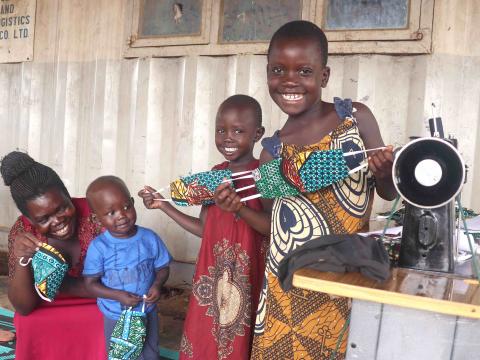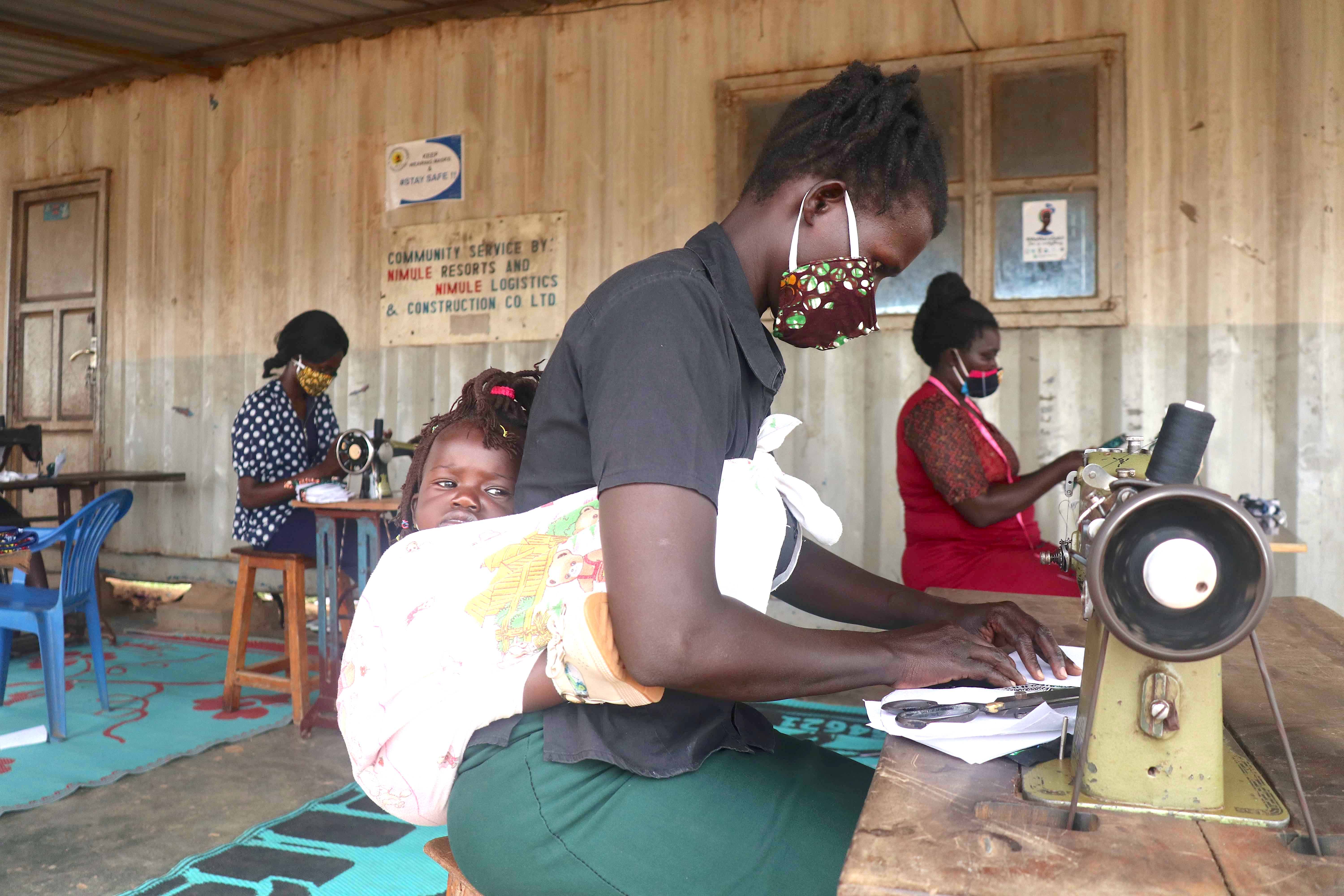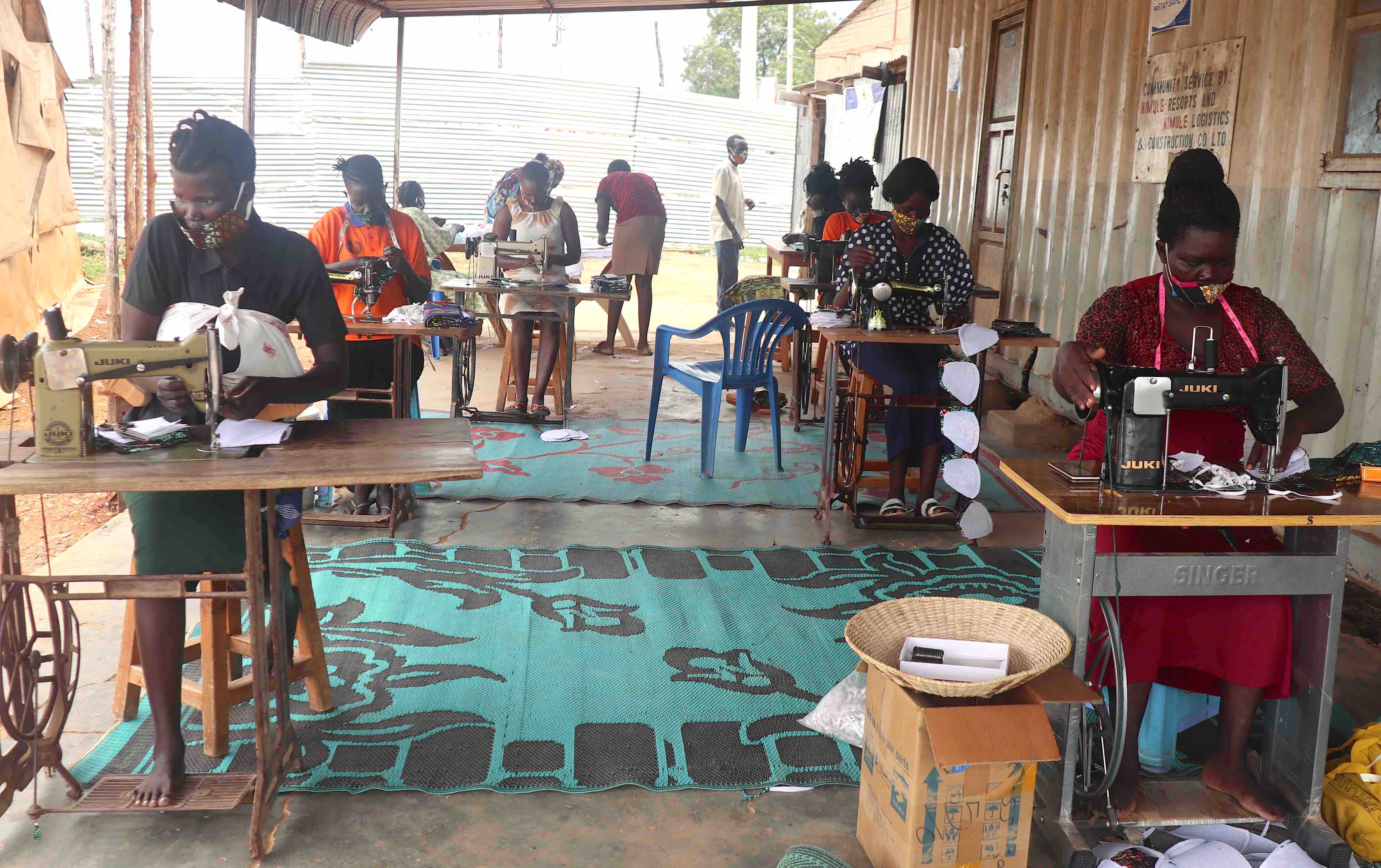HiddenHero: South Sudan’s mothers sew face masks for livelihood and protect communities from COVID-19

In Rock City, a dense suburb in South Sudan’s capital Juba, the sound of sewing machines filled the air. Colorful face masks made of local fabrics piled up fast as children played on the side while their mothers were busy at work.
World Vision’s Women Empowerment Program is doing just that — empowering women amid the COVID-19 pandemic. Supported by the World Food Programme (WFP), 165 vulnerable women and men were engaged in tailoring work after being trained and provided with sewing machines for livelihood.
When the coronavirus hit the country, many of their tailoring jobs slowed down for lack of customers. People were out of job and as conditions deteriorated, so did the demand for locally-sewn clothes. Seeing their plight, World Vision contracted the women’s group to produce 5,000 face masks following the safety requirements.
Related story: Shamim's fears

The women were very happy with the opportunity. They can earn income and also help stop the spread of COVID-19 in communities. They got to work producing an average of 500 face masks per day. The 3-layered face masks made of local cotton fabric are priced at US$3 each. Most importantly, this will mean a steady income for the group.
Rita Draleru, 38 and mother of six is the sole provider for her family. Her husband Alex Batali is still a student at Juba University. Rita is part of the group and has previously participated in World Vision’s vocational training programs to improve her skills as well as learn more about business.
“When the markets were closed down due to coronavirus, I worried about about my two children in Uganda and my family here in Juba. My nights were filled with sorrow. I tried working from home but there were very few customers. When the group called me to sew masks for World Vision and other organizations, I was overjoyed,” Rita shares.
Watch video: #HiddenHero - Serving with courage and love

Many families in South Sudan, like Rita’s, left their studying children in Uganda for better schools and other learning opportunities. When the pandemic closed the border between two countries, many parents became desperate until the lockdown was eased.
My husband lost his job after the company closed due to COVID-19. I also lost customers after news of the first case was confirmed. People stopped bringing clothes to be sewn. I became frustrated and even contemplated ending my life. My children and this project gave me hope.
This hardworking mother produces an impressive 70 masks per day. Dealing with the situation has been tough for Rita. “Coronavirus affected me in many ways. I suffered a lot due to quarantine and the closure of markets”, she says. For now, she is grateful that she can put food on her family’s table. “If it wasn’t for this initiative, I would be sitting at home and struggling,” she adds.
Rita’s 8-year-old daughter Hope Eunice says, “I saw my mother cry many times when the markets were closed. I thought someone fought with her. But when she started working at the center I noticed she became happy again. I take care of my siblings as she works and I love going to the center with her.”
Watch video: COVID-19 impacts school feeding programs

Anna Juan, 32 and a widow supports four children. She says, “I was among the first people to be trained by World Vision in 2017, four years after my husband died. The training did not only change our lives but help me forget sad memories of my husband’s death. We depended on him for everything and I was scared how I will support the family”, Anna shares.
An experienced tailor Anna adds, “I was unable to pursue education due to poverty. Coronavirus has caused a lot of problems, the most difficult was the closure of markets and schools. This job is helping me feed my children and provide for their needs.”
Tabu Beida, another mother, finds strength in earning for her children’s needs. She says, “My husband lost his job after the company closed due to COVID-19. I also lost customers after news of the first case was confirmed. People stopped bringing clothes to be sewn. I became frustrated and even contemplated ending my life. My children and this project gave me hope.”

"The pandemic affected people socio-economically, with biggest impact on small businesses that involved women like selling in the market. Sadly, this reversed gains on poverty alleviation efforts. But most people are beginning to adjust by opening up businesses just like the women's group that World Vision supports”, says Emilienne Cyuzuzo, World Vision’s Food & Cash Assistance Manager.
Cyuzuzo adds, “When we needed the masks as part of our staff’s personal protective equipment (PPE) at work, we felt it is also an opportunity to support the women’s group that joined World Vision’s vocational program. They were provided with tailoring kits upon graduation so they were equipped and ready. This boosted their business, enabling them to support their families.”
As other organizations started placing orders from the group, the women’s excitement and hope have risen knowing that despite the difficult circumstances, they can always support each other in time of need.

Story and photos by Scovia Faida Charles Duku, Communications Coordinator